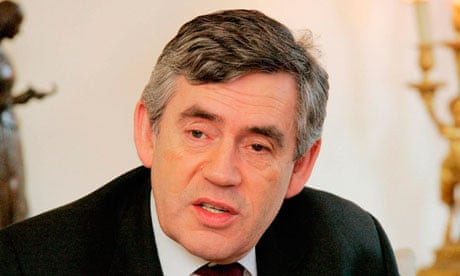Gordon Brown, the former prime minister, will become the United Nations special envoy for education – marking a return to frontline diplomacy.
Brown will launch a new UN push on universal education in September, calling for a fund to finance schools and train 2 million teachers.
The unpaid appointment by the UN secretary general, Ban Ki Moon, underlines concerns that the world will miss its target in 2015 to ensure that all children will be able to complete primary school. Unlike health, education has suffered from a lack of interest and cash from international donors.
Since leaving Number 10, Brown has been criticised for his muted performances in parliament. He has argued that most other former PMs have been similarly quiet and that he has focused on constituency matters and his "international work" – meeting leaders across on the globe to ensure the economic slump does not mean countries renege on their aid commitments.
In a statement, Brown said he hoped to emulate the successes of Kofi Annan and Bill Clinton, special UN envoys for Syria and Haiti. "Ensuring that every child in the world has the opportunity to go to school and to learn is a longstanding passion of mine. Education breaks the cycle of poverty and unlocks better health and better job prospects," he said.
In a review of development goals earlier this year Brown warned: "The international community is failing to honour a promise made to the world's children – a promise that the G8 underwrote. And my conviction is that this is both unnecessary and counter-productive. It combines indefensible ethics with unsound economics."
Unesco has warned that if trends continue the number of children out of school in 2015 could be higher than the 70 million today. The UN body warned that the poorest 46 nations in the world needed $16bn a year to meet the goal of universal education but that after the crash of 2008, governments were only putting up $2bn in aid.
Brown, who remains an MP, held talks with the Burmese opposition leader Aung San Suu Kyi when she was in London last month and will raise the issue on the world stage that 10% of children in the country, about 400,000, do not attend school. Just 1% of Burma's GDP is spent on education – less than almost any other nation in the world.
The Labour politician says that half of the world's out-of-school children live in countries affected by conflict. Some are internally displaced people. Others – like the Burmese children in Thailand – are living as refugees.
Many more are living in post-conflict countries such as South Sudan, where he has argued "peace has failed to deliver a peace premium in education". Earlier this year Brown criticised the body responsible for financing the multilateral donor effort in South Sudan – the Global Partnership for Education – saying it had been slow to react to the unfolding crisis in the world's newest nation.
